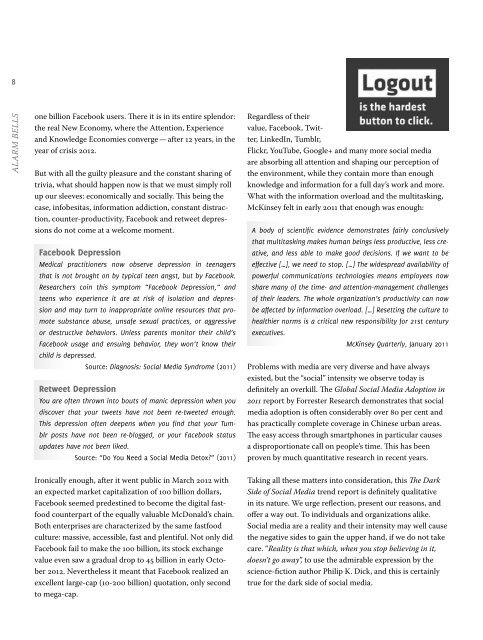VINT-The-Dark-Side-of-Social-Media-Alarm-Bells-Analysis-and-the-Way-Out
VINT-The-Dark-Side-of-Social-Media-Alarm-Bells-Analysis-and-the-Way-Out
VINT-The-Dark-Side-of-Social-Media-Alarm-Bells-Analysis-and-the-Way-Out
Create successful ePaper yourself
Turn your PDF publications into a flip-book with our unique Google optimized e-Paper software.
8<br />
alarM BellS<br />
one billion Facebook users. <strong>The</strong>re it is in its entire splendor:<br />
<strong>the</strong> real New Economy, where <strong>the</strong> Attention, Experience<br />
<strong>and</strong> Knowledge Economies converge — after 12 years, in <strong>the</strong><br />
year <strong>of</strong> crisis 2012.<br />
But with all <strong>the</strong> guilty pleasure <strong>and</strong> <strong>the</strong> constant sharing <strong>of</strong><br />
trivia, what should happen now is that we must simply roll<br />
up our sleeves: economically <strong>and</strong> socially. This being <strong>the</strong><br />
case, infobesitas, information addiction, constant distraction,<br />
counter-productivity, Facebook <strong>and</strong> retweet depressions<br />
do not come at a welcome moment.<br />
Facebook Depression<br />
Medical practitioners now observe depression in teenagers<br />
that is not brought on by typical teen angst, but by Facebook.<br />
Researchers coin this symptom “Facebook Depression,” <strong>and</strong><br />
teens who experience it are at risk <strong>of</strong> isolation <strong>and</strong> depression<br />
<strong>and</strong> may turn to inappropriate online resources that promote<br />
substance abuse, unsafe sexual practices, or aggressive<br />
or destructive behaviors. Unless parents monitor <strong>the</strong>ir child’s<br />
Facebook usage <strong>and</strong> ensuing behavior, <strong>the</strong>y won’t know <strong>the</strong>ir<br />
child is depressed.<br />
Source: Diagnosis: <strong>Social</strong> <strong>Media</strong> Syndrome (2011)<br />
Retweet Depression<br />
You are <strong>of</strong>ten thrown into bouts <strong>of</strong> manic depression when you<br />
discover that your tweets have not been re-tweeted enough.<br />
This depression <strong>of</strong>ten deepens when you find that your Tumblr<br />
posts have not been re-blogged, or your Facebook status<br />
updates have not been liked.<br />
Source: “Do You Need a <strong>Social</strong> <strong>Media</strong> Detox?” (2011)<br />
Ironically enough, after it went public in March 2012 with<br />
an expected market capitalization <strong>of</strong> 100 billion dollars,<br />
Facebook seemed predestined to become <strong>the</strong> digital fastfood<br />
counterpart <strong>of</strong> <strong>the</strong> equally valuable McDonald’s chain.<br />
Both enterprises are characterized by <strong>the</strong> same fastfood<br />
culture: massive, accessible, fast <strong>and</strong> plentiful. Not only did<br />
Facebook fail to make <strong>the</strong> 100 billion, its stock exchange<br />
value even saw a gradual drop to 45 billion in early October<br />
2012. Never<strong>the</strong>less it meant that Facebook realized an<br />
excellent large-cap (10-200 billion) quotation, only second<br />
to mega-cap.<br />
Regardless <strong>of</strong> <strong>the</strong>ir<br />
value, Facebook, Twitter,<br />
Linked In, Tumblr,<br />
Flickr, YouTube, Google+ <strong>and</strong> many more social media<br />
are absorbing all attention <strong>and</strong> shaping our perception <strong>of</strong><br />
<strong>the</strong> environment, while <strong>the</strong>y contain more than enough<br />
knowledge <strong>and</strong> information for a full day’s work <strong>and</strong> more.<br />
What with <strong>the</strong> information overload <strong>and</strong> <strong>the</strong> multitasking,<br />
McKinsey felt in early 2011 that enough was enough:<br />
A body <strong>of</strong> scientific evidence demonstrates fairly conclusively<br />
that multitasking makes human beings less productive, less creative,<br />
<strong>and</strong> less able to make good decisions. If we want to be<br />
effective […], we need to stop. […] <strong>The</strong> widespread availability <strong>of</strong><br />
powerful communications technologies means employees now<br />
share many <strong>of</strong> <strong>the</strong> time- <strong>and</strong> attention-management challenges<br />
<strong>of</strong> <strong>the</strong>ir leaders. <strong>The</strong> whole organization’s productivity can now<br />
be affected by information overload. […] Resetting <strong>the</strong> culture to<br />
healthier norms is a critical new responsibility for 21st century<br />
executives.<br />
McKinsey Quarterly, January 2011<br />
Problems with media are very diverse <strong>and</strong> have always<br />
existed, but <strong>the</strong> “social” intensity we observe today is<br />
definitely an overkill. <strong>The</strong> Global <strong>Social</strong> <strong>Media</strong> Adoption in<br />
2011 report by Forrester Research demonstrates that social<br />
media adoption is <strong>of</strong>ten considerably over 80 per cent <strong>and</strong><br />
has practically complete coverage in Chinese urban areas.<br />
<strong>The</strong> easy access through smartphones in particular causes<br />
a disproportionate call on people’s time. This has been<br />
proven by much quantitative research in recent years.<br />
Taking all <strong>the</strong>se matters into consideration, this <strong>The</strong> <strong>Dark</strong><br />
<strong>Side</strong> <strong>of</strong> <strong>Social</strong> <strong>Media</strong> trend report is definitely qualitative<br />
in its nature. We urge reflection, present our reasons, <strong>and</strong><br />
<strong>of</strong>fer a way out. To individuals <strong>and</strong> organizations alike.<br />
<strong>Social</strong> media are a reality <strong>and</strong> <strong>the</strong>ir intensity may well cause<br />
<strong>the</strong> negative sides to gain <strong>the</strong> upper h<strong>and</strong>, if we do not take<br />
care. “Reality is that which, when you stop believing in it,<br />
doesn’t go away”, to use <strong>the</strong> admirable expression by <strong>the</strong><br />
science-fiction author Philip K. Dick, <strong>and</strong> this is certainly<br />
true for <strong>the</strong> dark side <strong>of</strong> social media.


